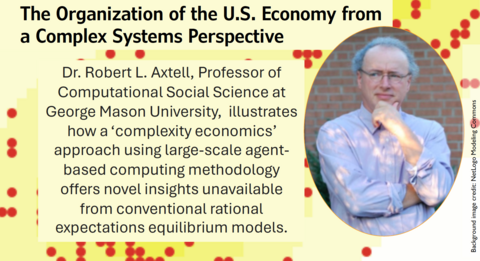
WICI Speaker Series with Robert Axtell
The Organization of the U.S. Economy from a Complex Systems Perspective
Verbal descriptions of modern industrial economies are thick with details concerning the number of firms and consumers, the sizes of sectors, government activities, and so on. But formal models of such economies either compress all the real-world heterogeneity into a few statistical (econometric) equations or else focus on the incentives faced by a representative agent, simultaneously a worker, consumer, and investor. In this talk I will take a radically different approach. Using rich micro-data on U.S. firms and their employees, I will describe a computational model in which 120 million self-interested agents arrange themselves into some 6 million firms, reproducing several dozen statistical features present in the micro-data, from heavy-tailed firm sizes and skew firm ages and lifetimes to asymmetric firm growth rate distributions, emergent inter-firm networks, financial variables having peculiar scaling with firm size, and inhomogeneous distribution of firms and employees over physical space. Large-scale agent-based computing is the methodology for realizing these results. At this WICI Speaker Series event, Dr. Robert L. Axtell will argue that this ‘complexity economics’ approach offers novel insights unavailable from conventional rational expectations equilibrium models.
Please register for this free event below!
In-person attendees will be provided light refreshments and an opportunity for informal networking at the start of the event.
About the Speaker

Dr. Robert L. Axtell is a Professor of Computational Social Science at George Mason University in Fairfax, Virginia, U.S.A. Previously, he was a senior fellow at the Brookings Institution (Washington, D.C., U.S.A.) and a founding member of the Center on Social and Economic Dynamics there. He holds an interdisciplinary PhD from Carnegie Mellon University (Pittsburgh, USA).
He teaches courses on agent-based modelling, mathematical modelling, and game theory. His research is situated at the intersection of economics, behavioural game theory, and multi-agent systems computer science. His most recent research attempts to emerge a macroeconomy from tens of millions of interacting agents.
His research has been published in “Science”, “Proceedings of the National Academy of Sciences USA”, and leading field journals. Popular accounts have appeared in newspapers, magazines, books, online, on the radio and in museums. He is the developer of Sugarscape, an early attempt to integrate social science with multi-agent systems, and co-author of Growing Artificial Societies: Social Science from the Bottom Up (MIT Press 1996).
Location Information
200 University Avenue West
DC Room 1302
Waterloo, ON, CA N2L 3G1